On Feb. 15, 2021, I stood at the bottom stairs of the apartment complex where my mom lived—a place in Bangor, Maine, that housed Native tenants only—and I waited for the officers to complete their wellness check, waited for mom to come down the stairs in her pajamas to yell at me, as she often did when people checked in on her when she didn’t want to be bothered. But the only person to descend those stairs was one of the two officers.
“I’m very sorry,” the officer began, and you can figure out the rest.
Two thousand twenty-one has been full of highs and lows. Of the highs, I have a book coming out in 2022 and my nephew was born, cute as a could be (flawless, dashing—what a head of hair!—and otherworldly in the way babies are). Of the lows, my mom is gone. That one alone weighs so, so much.
My mother’s death really impacted my ability to read. To stay focused. I didn’t read as much as I normally do in a year. But I did read—I did find occasional solace in literature as a means to heal.
I spent a great deal of time rereading works I read when my mom was alive, and I can tell you for certain the very first thing I reread was “Joy” by Anton Chekhov, translated by Robert Payne. In this story, a disheveled and excited Mitya Kuldarov burst into his parents’ apartment at midnight, waking his mother, father, his sister, and his two little brothers to tell them—to show them—that he made the newspaper. With great dialogue and pacing (I mean, it’s Anton Chekhov), readers learn that Mitya came out of a tavern, drunk, and slipped and fell under a horse, which terrified the horse, which ultimately jumped over Mitya, and a part of the sleigh wacked him and knocked him unconscious. Mitya thinks he’s famous for making the news, and the story ends with him running out to go tell others in the neighborhood.
The story was one I had read to my mother, and one we laughed at, but it was made funnier by the notion of making the newspaper. For years, my mother kept two newspaper clippings on her fridge: one about me, and one about my sister.
Mine read: “Local Penobscot Teen Wins State of Maine Youth of the Year.”
My sister’s read: “Three arrested after chicken, potatoes, vodka stolen from grocer.”
Sure, mom did this deliberately, but I’m unconvinced it was out of pure irritation or anger. Mom loved us both the same regardless of our headlines. 

“Joy” brought me joy, but not enough to heal, fully, the pain I felt. And so I found it difficult to move on from what was familiar, but at times I did find myself able to read new work, was able to move forward into the present that hurt. Megan Devine’s It’s OK That You’re Not OK (Meeting Grief and Loss in a Culture That Doesn’t Understand) became medicine, and Jeffrey McDaniel’s Holiday in the Islands of Grief: Poems touched something in my soul—especially “Wooden Bench”—I don’t know where I’d be without that piece.


 As time moved forward, reading got easier, but I still found it hard to pull away from the comfort of Netflix, other streaming services, video games like Skyrim and Fallout 4, and chess, which became a strange addiction when my mother moved on. I began to play and read about it. I read and studied books like Bobby Fischer Teaches Chess by Bobby Fischer, Chess Fundamentals by Jose Capablanca, Discovering Chess Openings: Building Opening Skills from Basic Principles by John Emms, Logical Chess: Move By Move: Every Move Explained New Algebraic Edition by Irving Chernev, Modern Chess Openings by Nick De Firmian, and many more. Chess became therapeutic, and I learned an important lesson:
As time moved forward, reading got easier, but I still found it hard to pull away from the comfort of Netflix, other streaming services, video games like Skyrim and Fallout 4, and chess, which became a strange addiction when my mother moved on. I began to play and read about it. I read and studied books like Bobby Fischer Teaches Chess by Bobby Fischer, Chess Fundamentals by Jose Capablanca, Discovering Chess Openings: Building Opening Skills from Basic Principles by John Emms, Logical Chess: Move By Move: Every Move Explained New Algebraic Edition by Irving Chernev, Modern Chess Openings by Nick De Firmian, and many more. Chess became therapeutic, and I learned an important lesson:
I’m not Beth Harmon.

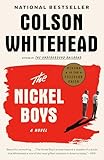
 During the summer, still sticking to things I had already read, I had to prepare my college courses for the fall. I revamped my literature course to include The Complete Maus by Art Spiegelman, The Nickel Boys by Colson Whitehead, and The Round House by Louise Erdrich, as well as a scattering of poems and short stories, such as Karen Russell’s “St. Lucy’s Home for Girls Raised by Wolves,” which, every time I read it, I hear the atrocious Native Boarding school era’s mantra, “Kill the Indian in him, and save the man,” but instead in Russel’s story it becomes “Kill the werewolf in her, and save the girl.” Having spent a great deal of time reading about chess and studying it, my having to reread all three of these works for my upcoming course was like taking a defibrillator right to the chest: I woke up. The idea of survival and trauma and healing in all three of these indelible works brought me so low, but, as the best literature does, it lifted me, my spirit. They were transcendental, like holding my nephew or seeing that smile. They showed me Life.
During the summer, still sticking to things I had already read, I had to prepare my college courses for the fall. I revamped my literature course to include The Complete Maus by Art Spiegelman, The Nickel Boys by Colson Whitehead, and The Round House by Louise Erdrich, as well as a scattering of poems and short stories, such as Karen Russell’s “St. Lucy’s Home for Girls Raised by Wolves,” which, every time I read it, I hear the atrocious Native Boarding school era’s mantra, “Kill the Indian in him, and save the man,” but instead in Russel’s story it becomes “Kill the werewolf in her, and save the girl.” Having spent a great deal of time reading about chess and studying it, my having to reread all three of these works for my upcoming course was like taking a defibrillator right to the chest: I woke up. The idea of survival and trauma and healing in all three of these indelible works brought me so low, but, as the best literature does, it lifted me, my spirit. They were transcendental, like holding my nephew or seeing that smile. They showed me Life.


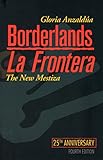 I began to read more. I devoured Cara Hoffman’s forthcoming story collection, Ruin, which is full of stories that are startling intelligent and press the boundaries of short fiction. As I usually do, in the fall I bought the Best American Short Stories 2021 edited by Jesmyn Ward, and while all the stories were remarkable, I was stunned by “The Rest of Us” by Jenzo DuQue, a Colombian-American writer whose voice is powerful and singular and whose prose works to reconcile and complicate language in much the same way as Gloria Anzaldúa’s Borderlands/La Frontera: The New Mestiza, which I also reread this year.
I began to read more. I devoured Cara Hoffman’s forthcoming story collection, Ruin, which is full of stories that are startling intelligent and press the boundaries of short fiction. As I usually do, in the fall I bought the Best American Short Stories 2021 edited by Jesmyn Ward, and while all the stories were remarkable, I was stunned by “The Rest of Us” by Jenzo DuQue, a Colombian-American writer whose voice is powerful and singular and whose prose works to reconcile and complicate language in much the same way as Gloria Anzaldúa’s Borderlands/La Frontera: The New Mestiza, which I also reread this year.


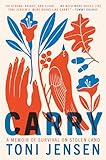 As an Indigenous writer, I can’t not mention the books by Native authors I read this year: I reread Brandon Hobson’s Where the Dead Sit Talking and then read his newest novel, The Removed, and I was mesmerized yet again by his storytelling, the exigence of his work, and the beauty of his prose. I then read White Magic by Elissa Washuta, an essay collection unlike any I’ve read. It was, pun intended, magic. The essays worked in ways I didn’t think you could get away with. I’m still dazzled not only by the content, but by the craft of the book—I’m still trying to figure it out. It is originality at its finest. And I read Carry: A Memoir of Survival on Stolen Land by Toni Jensen, a collection of essays that explores violence, trauma, Native experience, and, as the title says, survival on stolen land. Her work was a great compliment to the fiercely intelligent Red Nation Rising: From Bordertown Violence to Native Liberation by Nick Estes, Melanie K. Yazzie, Jennifer Nez Denetdale, and David Correia, with a foreword by Radmilla Cody and Brandon Benallie. All of these works helped me see the world again, the present world, the one I had hidden from because of my mother’s death.
As an Indigenous writer, I can’t not mention the books by Native authors I read this year: I reread Brandon Hobson’s Where the Dead Sit Talking and then read his newest novel, The Removed, and I was mesmerized yet again by his storytelling, the exigence of his work, and the beauty of his prose. I then read White Magic by Elissa Washuta, an essay collection unlike any I’ve read. It was, pun intended, magic. The essays worked in ways I didn’t think you could get away with. I’m still dazzled not only by the content, but by the craft of the book—I’m still trying to figure it out. It is originality at its finest. And I read Carry: A Memoir of Survival on Stolen Land by Toni Jensen, a collection of essays that explores violence, trauma, Native experience, and, as the title says, survival on stolen land. Her work was a great compliment to the fiercely intelligent Red Nation Rising: From Bordertown Violence to Native Liberation by Nick Estes, Melanie K. Yazzie, Jennifer Nez Denetdale, and David Correia, with a foreword by Radmilla Cody and Brandon Benallie. All of these works helped me see the world again, the present world, the one I had hidden from because of my mother’s death.

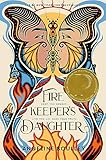
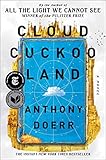 I have a tower of books next to my couch that I plan to read. August by Callan Wink, Firekeeper’s Daughter by Angeline Boulley, Cloud Cuckoo Land by Anthony Doerr, The Night Watchman by Louise Erdrich. The list goes on. But there’s one more on my to-read-list that I have to mention, because I’m excited to reread it: Tuesdays with Morrie by Mitch Albom. My mother was not a reader, but it was one of the few books she read and loved, so much so that she took me as young boy to watch a play of the book at the Penobscot Theatre in Bangor, Maine. I can see it. I can see us, sitting there, in the very front row, Mom holding my hand with both of hers and saying, “You’re going to love this, gwus” and as the curtain opens, as the lights dim, we’re both together, her hand on mine.
I have a tower of books next to my couch that I plan to read. August by Callan Wink, Firekeeper’s Daughter by Angeline Boulley, Cloud Cuckoo Land by Anthony Doerr, The Night Watchman by Louise Erdrich. The list goes on. But there’s one more on my to-read-list that I have to mention, because I’m excited to reread it: Tuesdays with Morrie by Mitch Albom. My mother was not a reader, but it was one of the few books she read and loved, so much so that she took me as young boy to watch a play of the book at the Penobscot Theatre in Bangor, Maine. I can see it. I can see us, sitting there, in the very front row, Mom holding my hand with both of hers and saying, “You’re going to love this, gwus” and as the curtain opens, as the lights dim, we’re both together, her hand on mine.
More from A Year in Reading 2021 (opens in a new tab)
Don’t miss: A Year in Reading 2020, 2019, 2018, 2017, 2016, 2015, 2014, 2013, 2012, 2011, 2010, 2009, 2008, 2007, 2006, 2005









